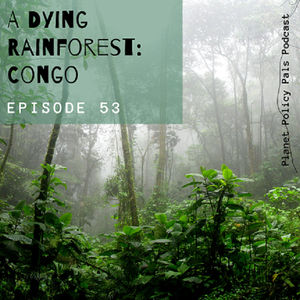
Planet Policy Pals Podcast
Ajwah Zahid and Alayibo Semenitari
EP 53: A Dying Rainforest- Congo
JUL 11, 202348 MIN

EP 53: A Dying Rainforest- Congo
JUL 11, 202348 MIN
Description
The UN estimated that in 2000 some 1.6 billion people around the world, including many of the world’s poorest, derived at least part of their food, income or medical needs directly from the forest. The Congo rainforest is the second biggest rainforest in the world and has lost more than 600,000 hectares of primary forest in 2020, which is a 9 percent increase compared to 2019, according to recent data from the Global Forest Watch (GFW). The biggest drivers of deforestation in the Congo rainforest over the past 30 years have been small-scale subsistence agriculture, logging, urban expansion, and mining. What has the impact been on the DRC, the general region, and the globe at whole? We discuss this, the lack of global efforts, and more in this episode.
Global land use changes are four times greater than previously estimated | Nature
Global land use change, economic globalization, and the looming land scarcity | PNAS
Land degradation and climate change - resource | IUCN.
Climate change: Land degradation and desertification | WHO
Deforestation in Africa: Causes, Effects, and Solutions | Earth.Org
3 Surprising Ways Water Depends on Healthy Forests | World Resources Institute
Saving Africa’s forests, the ‘lungs of the world’ | Africa Renewal
Rainforests in Africa- Mongabay
How Colonialism Spawned and Continues to Exacerbate the Climate Crisis | Columbia news
COP27: Conserving the Congo Basin rainforest | African Wildlife Foundation
US tech giants sued over DRC cobalt mine child labour deaths | Al Jazeera
To save the Congo basin rainforest, end the conflict in the DRC | Al Jazeera
COP26: Landmark $500 million agreement to protect the DRC forest | UN.org
COP27 long on pledges, short on funds for forests | Mongabay.org
Women for Forests | WECAN International